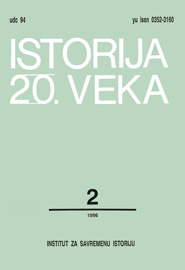ZAGREBAČKI SRBOBRAN О SRPSKOJ NARODNOJ RADIKALNOJ STRANCI U JUŽNOJ UGARSKOJ 1903-1914.
THE SERBIAN PEOPLE’S RADICAL PARTY OF SOUTH HUNGARY IN THE ZAGREB »SRBOBRAN« 1903-1914
Author(s): Ranka GašićSubject(s): Media studies, Political history, Recent History (1900 till today), Nationalism Studies, Pre-WW I & WW I (1900 -1919)
Published by: Institut za savremenu istoriju, Beograd
Keywords: "Srbobran"; Serbian People’s Independent Party; Serbian People’s Radical Party; media; Serbo-Croat coalition; conflict of interest; Slavonia; Srem;
Summary/Abstract: Relations between the Serbian People’s Independent Party in Croatia and Slavonia and the Serbian People’s Radical Party in south Hungary from 1903 to 1914 can be followed in the pages of the Zagreb »Srbobran«, a paper published by the Serbian People’s Independent Party. Both parties were partners in the Serbo-Croat coalition (1905-1907) and both were once part of Miletic’s Serbian People’s Liberal Party. The conflicts between these two parties can be qualified as conflicts of party interests (regarding spheres of influence, particularly in Slavonia and Srem) and as conflicts of ideas. The dissent concerning political ideas is much more significant and has been given greater attention. It revolves around differing views regarding national and church autonomy and the influence of hierarchy on the administration of national and church funds. The Liberals wished to see the Serbs’ position in the Monarchy resolved on a national level, in the parliaments, while the Radicals insisted this should be done through national and church autonomy. A further difference of opinion concerned the idea of national unity between the Serbs and Croats. To the Liberals this idea was the guiding line оf their politics, while the Radicals discarded it as being detrimental to Serbian interests. Consequently, the Radicals were criticized in »Srbobran« for leaving the Serbo-Croat coalition in 1907 and were accused of collaborating with the government at the time of the trials for high treason in 1909. The differences between these parties regarding Serbian politics in Bosnia also derived from their general views of unity between Serbs and Croats. The parties divergent views were the result of the fact that they acted in different regions of the Monarchy in which the treatment of the Serbian people was also different. This created different needs in terms of daily politics, such as co-operation with the Hungarians (for the Radicals) and with the Croatians (for the Liberals).
Journal: Istorija 20. veka
- Issue Year: 1996
- Issue No: 2
- Page Range: 109-121
- Page Count: 13
- Language: Serbian

